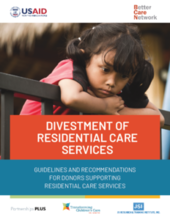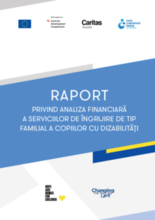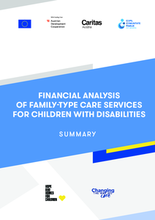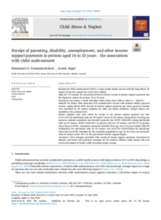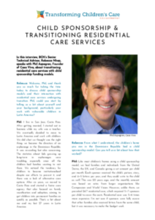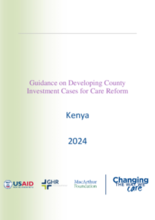Displaying 11 - 20 of 189
These guidelines have been written to guide donors and partners through the process of gathering information, making the decision to divest, securing buy-in internally for divestment, engaging with partners and stakeholders, developing a divestment plan, communicating that plan, and addressing any child safety concerns.
Serviciile alternative de tip familial sunt un element cheie în reforma sistemului de îngrijire a copilului în Moldova. Totuși, copiii cu dizabilități sunt, încă, sub-reprezentați în grupul de copii în familiile de asistenți parentali profesioniști și părinți-educatori din casele de copii de tip familie. Unul dintre obstacolele menționate de specialiștii în domeniu, de asistenții parentali profesioniști și părinții-educatori este sprijinul financiar insuficient, care limitează accesul copiilor cu dizabilități în servicii de tip familial.
CCF Moldova conducted a comprehensive financial analysis of foster care services for children with disabilities to identify financial gaps for current foster carers and financial impediments that deter placement of children with disabilities in foster care. The report provides concrete recommendations to address gaps and cost implications of implementing new funding policies.
This study was based in Southern Australia and aimed to examine the association between child maltreatment and the receipt of income support payments and the budgetary impact for persons 16 to 33 years.
In this interview, BCN’s Senior Technical Advisor, Rebecca Nhep, speaks with Phil Aspegren, Founder of Casa Viva, about transitioning residential care services with child sponsorship funding models.
Melody Curtis, Laura Horvath, Jared Scheppman, and Kelly Strong discuss the journey from traditional child sponsorship models to a new paradigm that champions community empowerment. They also tackle the ethical dilemmas and strategic decisions that are reshaping the way we support vulnerable children around the world.
The objective of this guidance is to provide a ‘how-to’ guide on developing a county-level investment case for care reform in Kenya.
“When we talk about equity and efficiency and what is right for children, when we provide services to families and children, we need to make sure that we are not just investing wisely, but that we are reaching

